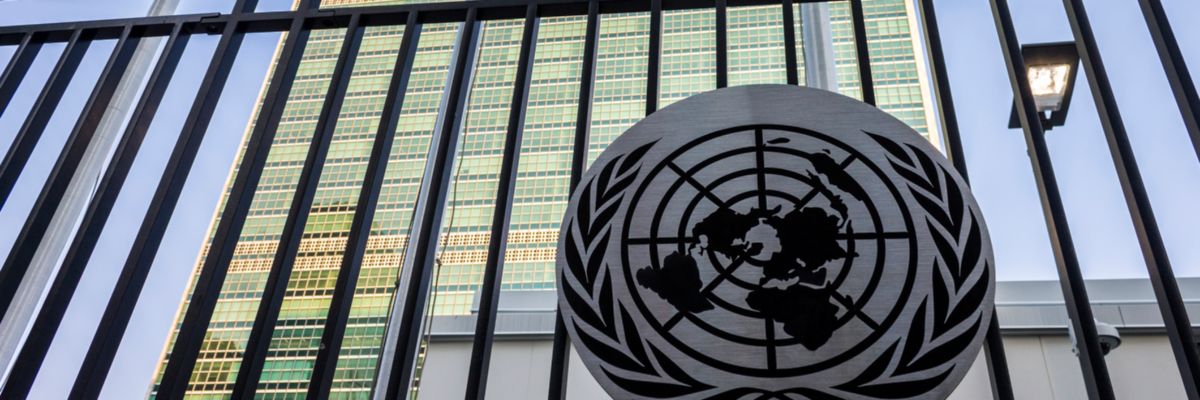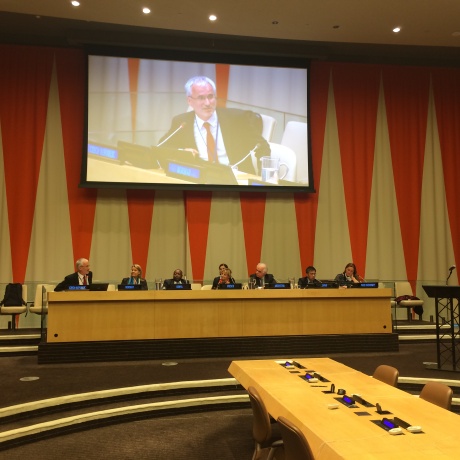
Antonín Fejfar spoke at the United Nations Headquartes
03. 06. 2019
Antonín Fejfar - who is the member of the Academic Council and the Deputy Director of the Institute of Physics of the Czech Academy of Sciences – spoke at the United Nations Headquarters in New York City. He gave a presentation on the mission of the Academy of Sciences in Czech science and education as a whole at a two-day conference entitled “Forum on Science, Technology and Innovation for Sustainable Development” (STI Forum) on the 14th and 15th of May.
The STI Forum is a key part of a specifically established mechanism of the UN for the exploitation of science, technology and innovation to meet the objectives of sustainable development by 2030. The added value of the Forum is that it connects any representatives of United Nations member states with scientific and academic community and private sector.
This year’s meeting was co-chaired by Marie Chatardová, a permanent representative of the Czech Republic at the UN, which made it possible to present the CR in the light of the Czech Republic, the Country for the Future innovation strategy.
Antonín Fejfar (left at the microphone) taking part in a panel discussion
Education and renewable sources
Antonín Fejfar spoke as a panelist in a block focused on the implementation of goals of education and inclusive and sustainable economic growth. He underlined the contribution of basic research in dealing with any specific developmental issues, such as HIV antiretroviral treatment or renewable energy sources in the framework of the Strategy AV 21. He also described the role played by the ELI Beamlines research infrastructure which was developed by the Institute of Physics of the Czech Academy of Sciences where the first experiments have been launched by external users.
Fejfar, himself a physicist, took part in an accompanying event, targeting the role of education for the development of science, technology and innovation, co-organized by the Czech Republic. To illustrate, he mentioned the cooperation between the Academy of Sciences and universities in raising students and experts in sciences and technology.
In this year’s STI Forum a thousand of representatives participated from member states, private sector, scientific institutions as well as universities. The conclusions of the Forum will serve as an important basis for a meeting of the Economic and Social Committee (ECOSOC) in July, during which any hitherto results of the implementation of sustainable development objectives will be evaluated.
It cannot only be about the commercialization of results
“The most significant and truly universal contribution of the Academy of Sciences and universities for any further development of society is that it generates creative, competent people with social engagement. Nowadays educational and research institutions have been - and must continue to be - focal points of creativity and critical thinking from which competences will be transferred to other fields of human activities, such as business, politics, culture and technical development,” says Antonín Fejfar, a recognized expert, working at the Instituted of Physics of the CAS since 1994, and the head of the Division of Thin Films and Nanostructures. Simultaneously, he has been the chairman of the Scientific Council of the Czech Academy of Sciences. In his research, Fejfar has concentrated on the physics of nanostructured semiconductor thin films to be used in solar panels and photonics. He has gained international experience too; he has held a position of a visiting professor at the Institute of Chemical Research at Kyoto University in Japan.
“Attempts to reduce social benefits of education and science to direct transfer of innovation and commercialization of their results only would be counterproductive and would ultimately undermine the dynamics of economic, social and cultural changes and any further development of Czech society,“ adds Fejfar who thinks that educational institutions are a source of inspiration for companies. “If industry decides what should be taught at schools, this will gradually lead to degradation as companies will have no source of inspiration,“ says Fejfar.
Prepared by: Antonín Fejfar, the Institute of Physics of the CAS, Alice Horáčková, Media Communication Section of the CAS
Photo provided by A. Fejfar
Read also
- Public Hearing: “Making Sense of Open Science”
- SUNER-C concludes after three years dedicated to the renewable energy future
- A trapped state: The pandemic impact on public attitudes, trust, and behavior
- Aerial archaeology: Tracing the footsteps of our ancestors from the sky
- Archaeologists uncover ancient finds along Prague Ring Road
- Our microbiome largely depends on what we eat, says microbiologist Michal Kraus
- The ABCs of writing: Why did its invention mark a turning point for humankind?
- We learn, remember, forget… What can memory actually do? And can we outsmart it?
- New Center for Electron Microscopy in Brno opens its doors to global science
- The hidden lives of waste: What can we learn from waste workers and pickers?
The Czech Academy of Sciences (the CAS)
The mission of the CAS
The primary mission of the CAS is to conduct research in a broad spectrum of natural, technical and social sciences as well as humanities. This research aims to advance progress of scientific knowledge at the international level, considering, however, the specific needs of the Czech society and the national culture.
President of the CAS
Prof. Eva Zažímalová has started her second term of office in May 2021. She is a respected scientist, and a Professor of Plant Anatomy and Physiology.
She is also a part of GCSA of the EU.

